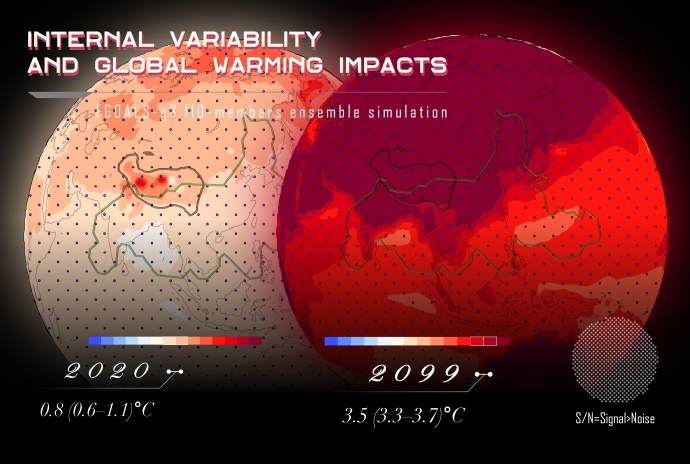The World Health Organization (WHO) warned in August this year that the Horn of Africa was experiencing one of the worst hunger crises in 70 years, with more than 37 million people suffering from acute hunger. and around seven million malnourished children under five in the region.
To avoid the worst, experts recommend an approach to food production that includes the sustainable use of existing natural resources through crop and animal production systems to achieve higher long-term agricultural productivity and incomes as part of climate variability.
Despite being the largest continent that has contributed little to the climate crisis, most African countries have been devastated by the impact of climate change. East African countries have seen the worst flooding in decades and the worst locust infestation in 70 years. Millions of people in the Sahel, southern and sub-Saharan regions are on the brink of starvation following an unprecedented drought.
Africa’s ability to adapt to climate change depends primarily on its ability to transform agriculture into a climate-resilient sector. The transition to agroecology, according to the Alliance for Food Sovereignty in Africa (AFSA), is a just way to tackle the climate crisis, restore mother earth and feed Africa and the world with food. healthy and nutritious.
During the first Africa Climate Week in Accra, Ghana, AFSA launched a policy advocacy campaign promoting agroecology as an African solution to climate change. Since then, AFSA’s Agroecology and Climate Change Working Group has been tirelessly advocating for agroecology to be recognized as a policy recommendation for climate change adaptation and mitigation in Africa.
As part of its ongoing efforts and in preparation for COP 27, AFSA, in collaboration with the Climate Change Consortium Ethiopia (CCCE) and the Environmental Protection Authority, organized a three-day conference Days on Climate Change in Addis Ababa last month under the theme “Africa’s Roadmap To Adaptation through Agroecology: Shaping Africa’s Position for COP27” aimed to provide a space for diverse climate actors to deliberate and develop a roadmap for transitioning to climate adaptation, community resilience and land justice through agroecology.
At this conference, African civil society organizations discussed and developed a strong call-to-action message to encourage African governments to adopt agroecology as Africa’s climate change adaptation agenda and to use the food systems approach to implement key policy solutions to the climate crisis.
The conference brought together government officials, CSOs, the private sector, service providers, donors and development partners, financial institutions, academic researchers, diplomatic missions and media from over 30 African countries.
The gathering brought together voices, best practices and key policy alternatives for urgent food systems transformation that will amplify solutions to the climate crisis, restore biodiversity, revitalize cultural diversity, build resilience, nourish our soils and reform our food systems.
Following the conference, the assembly of agroecology practitioners and activists across the African continent strongly called for the 27th session of the Conference of the Parties to the United Nations Framework Convention on Climate Change (UNFCCC) to highlight the recognition of agroecology for adaptation. put smallholder farmers at the center of adaptation and focus on climate finance for a sustainable food system.
The UNFCCC, also known as COP27, will take place in Sharm el-Sheikh, Egypt next month. The Addis assembly was the largest civil society movement in Africa representing 200 million small farmers, fishers, pastoralists, religious groups and indigenous peoples.
The Director General of Sustainable Agriculture in Tanzania (SAT), Janet Maro, said agroecology has the potential to contribute to feeding a growing population, climate adaptation and mitigation, economic empowerment, the promotion of social cohesion and the protection of the environment.
SAT’s vision is to see the majority of farmers using proven agroecological methods to improve their livelihoods, conserve the environment and reduce pressure on natural resources, while part of its mission is to transform farming practices in Tanzania through appropriate dissemination of knowledge, capacity building of farmers so that they can participate effectively in the value chain and engage with relevant public and private sector partners to build their capacity in agroecology.
Maro said that with climate change comes increasing pressure to feed the growing population which on the other hand is causing the depletion and degradation of natural resources and adding to the increase in environmental risks.
“When agriculture is not done well with respect for nature and people, it becomes the main contributor to greenhouse gases and further degradation. It is for these reasons that we need a transformation towards agroecology as a viable way of agriculture and life that takes care of the environment, land and people for decent incomes, food sovereignty and national food security,” said Maro. reference to SAT’s mission to work as a credible organization with a transparent, accountable and cost-effective approach to the holistic transformation of agriculture into an environmentally friendly and economically viable sector.
AFSA’s General Coordinator, Million Belay, said the alliance has been keen to advocate through various initiatives to make agroecology an African solution to climate change, adding that AFSA has four projects supporting the transition towards agroecology, namely healthy soils and healthy food, integrating agroecology in the climate. emergency policies, agroecological entrepreneurship and African food policy.
“On healthy soils and healthy food, we have begun to identify, strengthen, link and highlight key works and management of soils and landscapes through which 15 actors have been identified across the continent,” he said. -he declares.
Belay added that AFSA has created strong working relationships with India with the aim of facilitating the transition to agroecology through practical activities.
He said AFSA was working with youth and women, effectively engaging with the media, the African Group of Negotiators (AGN) in 12 African countries campaigning for the mainstreaming of agroecology in policy spaces of the climate crisis.
He said the goal of Africa Food Policy is to challenge the current approach to food policy in Africa and articulate a vision of what kind of food system Africans need and how it can be realized.
Regarding the recognition of agroecology for adaptation, the assembly asked that agroecology be prioritized to transform the agri-food system, build resilience and enable small farmers, pastoralists and fishermen to adapt to climate change, which which means that agroecology should be included in the UNFCCC climate negotiations.
Furthermore, COP27 should put smallholder farmers at the center of adaptation by involving small-scale food producers and indigenous communities, including women and youth, in the negotiations and beyond. Their role is critical as they are the once managed landscape across the continent and reject false solutions that threaten land and seeds and augment global agrochemical corporations.
“We demand that COP27 put agroecology at the center of Africa’s climate adaptation, building resilience for smallholder farmers, fishers, pastoralists, indigenous communities and their food systems.”
Baliraine Hakim, Chair of the Eastern and Southern Africa Smallholder Farmers Forum (ESAFF), said environment, climate change, food security and financial security cannot be isolated as they are interconnected and interdependent and therefore require corresponding systematic solutions.
Hakim said climate science is now an established field of science and its fundamental discoveries are well known to be caused by sunlight heating up the earth’s surface, with much of the reflected thermal radiation being absorbed by greenhouse gases in the atmosphere.
“All of these consequences are threats to global food security. In other words, systemic problems have harmful consequences in several different areas, while systemic solutions solve problems in several of these areas. This can be illustrated by the example of food systems and their causal links to climate change,” he said.
Hakim said excessive amounts of heat have been trapped by the greenhouse effect, causing Earth’s atmosphere to warm beyond safe levels. Warmer air means there is more energy and more moisture in the atmosphere, which can lead to a wide variety of consequences such as floods, tornadoes and hurricanes as well as droughts, waves heat and forest fires.
He added that the links between industrial agriculture and climate change are twofold at the same time as industrially produced food systems are energy intensive and fossil fuel based and therefore contribute significantly to climate change.
As a result, crops from genetically homogeneous monocultures typical of chemical agriculture are not resistant to climatic extremes which are becoming more and more frequent and violent. Industrial agriculture originated in the 1960s when petrochemical companies introduced new methods of intensive chemical farming. For farmers, the immediate effect was a dramatic improvement in agricultural production and the new era was hailed as the green revolution. But a few decades later, the dark side of chemical farming became painfully obvious.
Commenting on why COP27 needs to focus on financing agroecology, Irene Karani, Director for Africa at the Children Investment Fund Foundation (CIFF) said financing for agroecology will highlight the opportunities and successes of Africa in agroecology as a business to international public and private funders, based in Africa. financial institution and philanthropy, raising the African voice on agroecology on national, regional and global platforms through evidence-based movements and publications.




